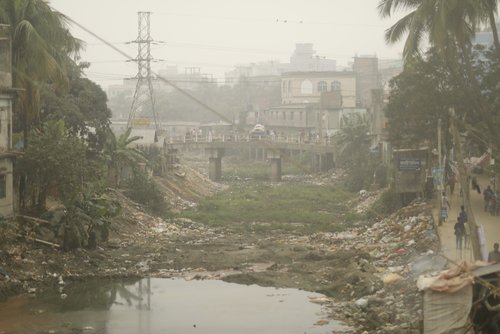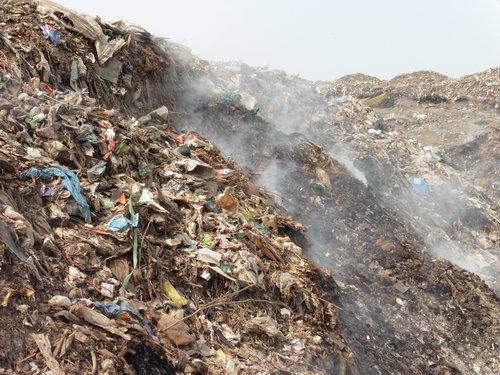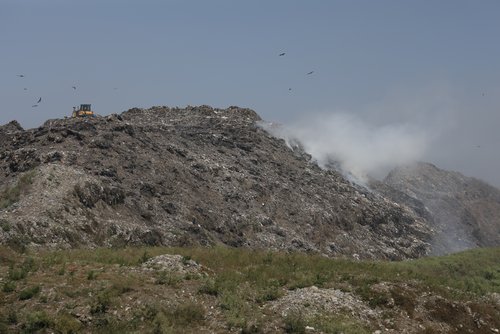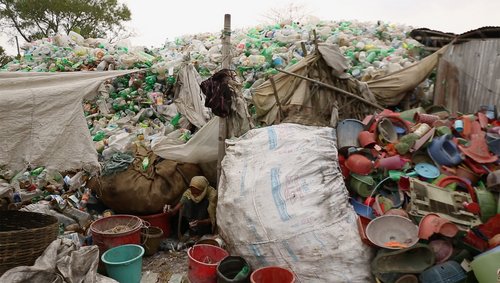Reducing Plastic Waste, Saving the Oceans — »SCIP Plastics« Project Worth Millions Launches in Weimar and Bangladesh
Approximately 480 tonnes of waste end up of the streets of Khulna, the largest city in the densely populated Ganges Delta, every day. This waste includes huge quantities of plastic, which then makes it way into the ocean via the adjacent waterways. If nothing is done to stop this, ocean contamination will continue to increase. The goal of this joint project is to establish a sustainable waste management system in Khulna to reduce plastic pollution and to protect marine ecosystems. The project, which is being funded with nearly four million euros, will be implemented under the leadership of the Bauhaus-Universität Weimar until 2024.
Bags, plastic bottles, toiletries — plastic makes up nearly three quarters of the garbage in the ocean. It can take thousands of years for this waste to completely decompose. Until it does, the plastic decays into smaller and smaller particles, and marine animals often mistake these particles for food, which can cause painful death. But how does plastic get into the ocean and what can we do about it? »A large proportion of waste is washed into the ocean from the land via rivers«, explains project leader Prof. Dr. Eckhardt Kraft from the Bauhaus-Universität Weimar. »This occurs predominantly in countries where waste management does not operate effectively«, adds the professor of Biotechnology in Resources Management.
Reorganising Waste Management in Khulna
Bangladesh has one of the highest levels of marine pollution in the world. The Issue: Cities like Khulna do not have a central point of contact for organising and coordinating waste management. There are no technical facilities for separating and recycling waste, so most of it winds up unsorted and unprocessed either on the roadside or in open landfills. »This waste not only causes bad odours and fosters diseases on the land, it also puts plants and animals in the nearby waters at risk«, explains Prof. Kraft. The goal of the »Sustainable Capacity Building to Reduce Irreversible Pollution by Plastics« (»SCIP Plastics« for short) is to reorganise waste management in Bangladesh so that plastic waste is prevented from being released into the environment in the first place.
Networking and Educating in the SCIP-Hub
The heart of this project is the »SCIP Hub«, a knowledge sharing centre that will be set up on the Khulna University of Engineering and Technology (KUET) campus. The Hub is where interdisciplinary partners from the industry, science, politics and the community can network to develop a plan for reorganising waste management in Khulna and implement various pilot projects to prevent plastic pollution. Part of the plan is to establish an »Awareness Centre« in downtown Khulna with the goal of educating the community on collecting, separating and disposing of waste and to generate awareness for using waste as a resource.
Learning from Pilot Projects
The project is primarily based on evaluating the existing chain of recyclable materials from a socio-economic perspective. Four pilot plants will be optimising how they collect recyclable plastic and testing new strategies for low-emission disposal in landfills. The »Recycling Shops«, which have until now existed only informally, will be integrated into the concept and improved according to environmental standards. In addition, the extent to which plastics can be replaced by locally produced jute will also be considered. A case study in the Port of Mongla will also analyse how the threat posed by plastic pollution in Bangladeshi ports can be stopped. The findings will be evaluated in the Hub and implemented on-site together with the Khulna City Corporation. The long-term goal of the project is to develop a national waste management strategy that will prevent plastic pollution.
»Sustainable Capacity Building to Reduce Irreversible Pollution by Plastics« (SCIP Plastics)
Funded by the Federal Ministry for the Environment, Nature Conservation, Nuclear Safety and Consumer Protection (BMU) based on ruling by the German Bundestag’s
»Marine Debris Framework – Regional Hubs Around the Globe« (Marine: DeFRAG) funding programme.
Duration: 01.10.2021 – 30.09.2024
Funding Amount: € 3,896,800.00
Project Management:
Prof. Dr. Eckhard Kraft
Bauhaus-Universität Weimar
Faculty of Civil Engineering
Bauhaus-Institute for Infrastructure Solutions (b.is)
Professorship of Biotechnology in Resources Management
Project Partners:
Institute for Social-Ecological Research (ISOE)
Khulna University of Engineering & Technology (KUET)
Chittagong University of Engineering & Technology (CUET)
Khulna City Corporation (KCC)
For additional information or questions, please contact Prof. Dr. Eckhard Kraft, Professor of Biotechnology in Resources Management, Faculty of Civil Engineering, via e-mail (waste[at]bauing.uni-weimar.de) or phone (+49 (0) 3643 / 58 4621).




